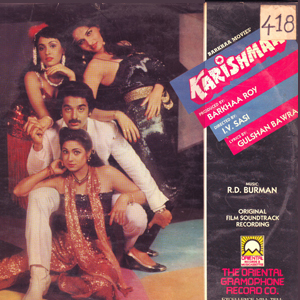Teri nazar se meri nazar ka

Film: Karishma (1983)
Producer: Barkha Roy
Director: I.V. Sasi
Lyricist: Gulshan Bawra
Singers: Kishore Kumar and Asha Bhosle
It may sound ironical that Pancham really had to wait until 1983 to get his first Filmfare award for Sanam Teri Kasam, and as usual he had underplayed with his comment “aakhir mila to kis film ko mila.” Of course Sanam Teri Kasam was not at all an average album, but he would have surely loved to be rewarded for better films like Amar Prem and Kati Patang or for his work in Gulzar’s greats like Aandhi and Ghar.
But it was the persistence of producer−director Barkha Roy in this event, and she continued the party with Pancham in her next venture Karishma, which was again quite musical but it dealt with the serious subject of narcotics. If the music in the earlier venture mainly revolved around the lead pair, then this film had a wider arena − with a female duet by Asha Bhosle and Kavita Krishnamoorthy (“Ek haseen lakhon mein”), a jazzy eight-minute marvel by Pancham himself (“Ek haseen gulbadan”) and the occasional detour to Tina Munim in “Khol doongi dil ka taala.”
And as written earlier, the film maintained its rishta (relation) with the earlier film. The lead pair was retained, with Reena Roy obviously the main purpose and glamour of the film. The title music was also repeated, and this romantic song (“Teri nazar se meri nazar ka”) showed its musical relation to its predecessor.
The song opens in the club with Reena singing with Pancham’s jazz-mataaz in its full glory and the swing served with the punch of the hi-hats, cymbals, whistling synths and yes, the bass guitar.
Asha as usual effortlessly treads this pattern with a perfect, restrained jazzy singing of the mukhda. Enters Kishore with his antics for Kamal Haasan, which disrupt the musical scene making it pause temporarily. The song, however, gets a new life with Reena’s chutkee-s and clapping. The rhythm slowly picks up and the tempo increases.
It’s in fact the start of the second prelude with the propelling violins that send the singing and dancing pair into fresh air and grassy landscapes with the “Sanam teri kasam” refrain fading in on the violins and stabilizing on the flanging guitars and Kishore entering with the melodic version of the sign line with the support of a suitably Indianized rhythm pattern. Asha as usual adapts to the new environment with amazing skill, adding lovely urge to her rendition.
The violins take over the baton so smoothly from the singers and lead from the front to give excellent support to the exuberant steps of the dancing pair while maintaining amazing control on the pace. The flanging guitar punctuates the pattern superbly. The returning violins end with a brief but lovely staccato climb to the crescendo that has the grace of a gymnast doing the floor exercises.
Pancham’s antara is as usual a different and more entertaining world. While absolutely not giving any idea about its pattern in the interludes, Pancham makes you do a sort of blind jump into the antara much like a slide into the waters from the cliff of a mountain. It opens with more urging but soft and melodic lines in contrast to the bold exuberance in the mukhda. Pancham embellishes it with the sprinkle of the sounds of the bell-tree served with a touch of bass. Reena looks beautiful in the Indian outfits while getting intimate with Kamal. Again,a sort of peculiar structure with the repeat of only first line that is sung softly in its first instance just to highlight the sentiment. A musical filler and the full antara lines appear now in an open-throated singing pattern.
The second interlude follows a near similar pattern as the first, but a subtle variation is always expected from Him. The violins going more rhythmic, guitar strums gain doing the punctuation but the following tides of violin now rush in with a smoother build-up than the earlier and the blind jump although familiar but enjoyable enough.
The second antara is served with the voice of the “delicious” Kishore and you wonder whether you have heard something like this in another song, although non-Pancham. Yes…it was done by their self-proclaimed chela-s Jatin Lalit in the song “Pehla nasha” from Jo Jeeta Wohee Sikandar (1991). Anyway, back to Pancham’s karishma, with Asha doing a lovely wrap-up with a sort of carefree touch along:
“Ohh…hota hai jo ho jaaye ab
chaahe jale zamaana”
with a crisp and timely landing on the mukhda sum.
Comes the third interlude and Pancham and the director give a deserved rest to the dancing couple and let them enjoy a boat ride. The santoors, which had simulated the royally Kashmiri grandeur of a shikara ride in “Aaoongi ek din” from Baseraa (1981), are now made to adapt to the situation and characters superbly and are suitably refurbished for the modern pedal boats, but the underlying melodic water is necessarily the same. Just mark the wrap of the interlude, with the ending portion now smoother and more intimate than before.
Gulshan Bawra’s contribution is also to be applauded here for giving some beautiful lyrics progressing to the intimacy as the song approaches its ending:
“Ho gayee ek yun apni parchhaiyaan,
Gungunane lagee aaj tanhaiyaan”
And after Kishore’s crossover, it’s Asha all the way in that lingering coda, singing the mukhda lines that merge into the refrain of “sanam teri kasam,” the rich violins taking over smoothly, may be for the nth time. We all know Pancham’s fascination for and use of the bass guitar in his compositions. Here too it is present in the entire progression, right from the jazzy start till this pahadi Indian ending with its ghumaar making this story of purana rishta memorable.
Sachmuch. ..kya kahein ab…
“pehli listen mein dil ne mere…apna tujhko maana…
PANCHAM…TERI KASAM”
Sudhir Kulkarni
panchammagic.org

